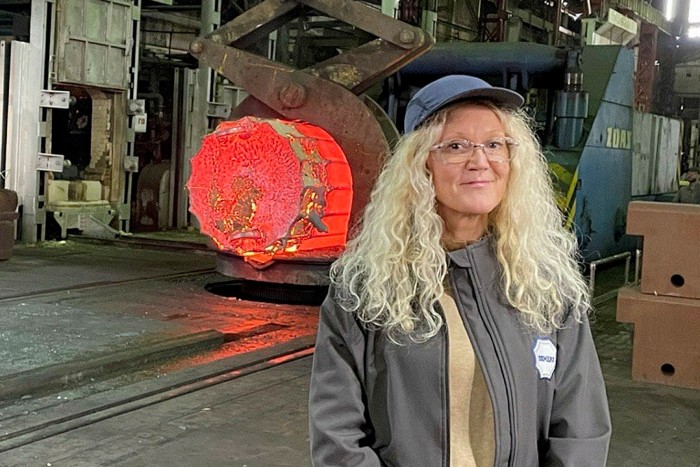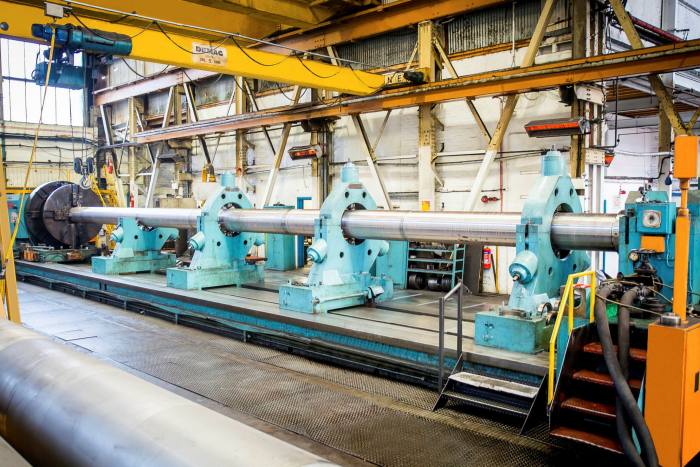Small UK businesses count the cost of lingering Trump-era steel tariffs
Somers Forge, a manufacturer of bespoke steel parts for the aerospace, automotive and nuclear industries based in the English midlands, has operated a US sales office for more than 30 years.
In April, the branch will close, a victim of tariffs on steel imports introduced in 2018 ago on national security grounds by then president Donald Trump.
“We’ve held on and held on with the hope that our government would succeed in revoking them [the tariffs],” said Tammy Inglis, finance director at Somers Forge, one of Britain’s biggest forgings specialists. “We are now into our fourth year and with all the added manufacturing costs, in particular the high energy costs, we can’t subsidise the branch any more. It’s not sustainable.”
Under the terms of the tariffs, US importers can apply for exemptions on certain products if they cannot be sourced domestically but Somers Forge is among dozens of small and medium-sized UK specialists that have been hit. Trade body UK Steel estimates that exports to the US have fallen from 351,000 tonnes in 2017 to just over 190,000 in 2020.

The US and the EU last October agreed to suspend the tariffs — 25 per cent on steel and 10 per cent on aluminium to manufacturers from the bloc — from January 1 but the UK government failed to secure a matching breakthrough.
The UK industry was already at a competitive disadvantage to European peers because of higher energy costs, an issue that has become even more critical amid the recent surge in wholesale gas and electricity prices. Somers Forge is among companies that have raised concerns with the government over costs.
Japan on Monday reached a similar deal with the US, with Washington announcing that it would suspend the 25 per cent levy on imports up to a certain quantity. The agreement does not cover aluminium.
The Financial Times reported in December that the US was delaying a deal with Britain because of concerns over London’s threats to change post-Brexit trading rules in Northern Ireland. Talks between the UK and the US on the issue restarted last month but for Somers Forge a deal, even if it comes this month, will be too late to reverse the decision to close its Michigan-based site.

Bright Steels, a family-run company in Yorkshire that makes steel bars for use in precision engineering applications, exports between 50 and 60 per cent of its output, including to the US. Philip Jackson, managing director, said the company had lost business to EU rivals as well as domestic American producers as a result of the tariffs.
He said he remained hopeful that if a deal was struck soon the company could yet recover some of that volume.
James Brand, managing director of foundries at United Cast Bar, a cast iron specialist that operates a foundry in Chesterfield, decided last year to launch a new size range at its site in Spain in order to avoid the 25 per cent levy.
“We heard a trade agreement was getting closer between the US and the EU so decided to make that size range in Spain,” he said. “It is business lost from the UK.” Brand said that if a deal could be done quickly, then the company might be able to bring some of what was moved to Spain to the UK.
“Britain is being left behind and strung along,” said John Healey, a Yorkshire-based Labour MP who has campaigned extensively on behalf of the industry. “People have a right to expect better from the government. Incompetent ministers are leaving steelmakers to pay the price, and the UK is continuing to lose out on the big US market.”
Gareth Stace, director-general of UK Steel, warned that the lifting of the tariffs was “essential to the ability of the UK steel sector to compete in this important market and recover lost sales”.
While US customers had been “reasonably successful” in securing exemptions to allow them to continue to import some UK steel tariff free, Stace added that “even this could be under threat if those customers, tired of waiting for a UK deal, determine that sourcing from the EU reduces administration and increases certainty for them”.
Britain’s largest producers warn of lost business opportunities as a result of the tariffs. The need for exclusions for individual products and customers means “we are very limited in our competitiveness towards existing customers and offerings towards new business opportunities”, said Tata Steel.
The tariffs are an added burden that manufacturers could do without at a time when soaring wholesale electricity and gas prices have already eroded profit margins. Although most companies have long-term contracts in place, many worry that a sustained increase in prices could undermine companies’ competitiveness. The government has so far stopped short of helping energy intensive users.
UCB’s Brand said he expected his energy bills to jump from 10-12 per cent of operating costs last year to 20 per cent by this autumn. The company is trying to pass on some of the extra expenditure but “this ultimately means higher prices for the consumers”.

At Somers Forge, Inglis said the company typically buys energy in advance for 18 months to two years. The hedging helped to insulate the business from last year’s peaks but the outlook for this year is less certain as Inglis has only locked in 25 per cent of the company’s needs from March onwards. “We are getting more and more exposed.”
The Department for International Trade said talks with the US had started and its focus was on “reaching a speedy resolution that lifts these tariffs promptly and clears the way for our thriving trading relationship to grow”.
For all the latest Business News Click Here
For the latest news and updates, follow us on Google News.
